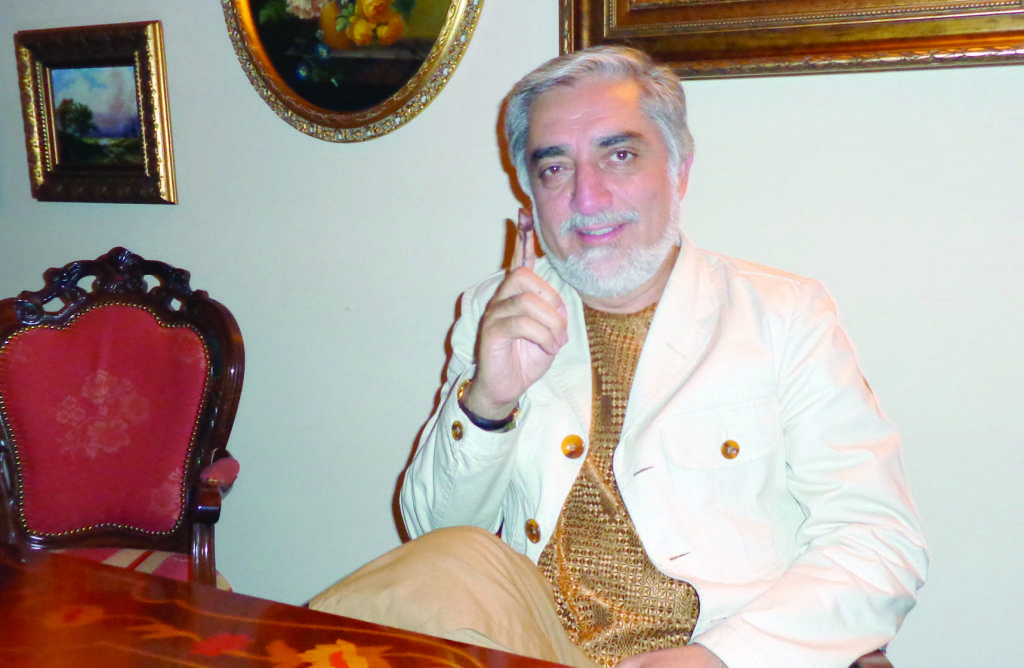Kabul, Asharq Al-Awsat— Despite worries that action by the Taliban would prove to be an insurmountable obstacle, Afghanistan’s election on April 5 saw a turnout of around 60 percent. There has since been some evidence of fraud, presented by the head of the country’s election complaints commission on Wednesday, but in all, Afghanistan’s presidential election has so far gone relatively well for a country plagued by corruption, insurgency, sectarian divisions and a weak central government.
However, with many ballot boxes from rural districts still on their way to Kabul along the countries notoriously ramshackle transport system, it will be the last week of April at the earliest before a definitive result is announced, and if no candidate receives a majority of the vote a second round will be held.
As Afghanistan and the rest of the world wait for the results, Asharq Al-Awsat sat down for a short interview with one of the race’s three frontrunners, former foreign minister Dr. Abdullah Abdullah of the National Coalition for Afghanistan.
Originally trained as an ophthalmologist, Abdullah, a former member of the Northern Alliance, unsuccessfully ran for the presidency in 2009, placing second in the vote behind then-incumbent and now outgoing President Hamid Karzai. He subsequently dropped out of the race before the second runoff round, alleging corruption.
Asharq Al-Awsat: Do you think you will be next president of Afghanistan?
Abdullah Abdullah: I don’t want to make a judgment on behalf of the election commission, as were are only at the start of the process, but I will say that it is going very well, so far, for us.
Q: If you are elected, what issues would you prioritize?
The priorities of the future government of Afghanistan should be to look at security as well as the rule of law. Then, of course, they must also look at the betterment of life for the people of Afghanistan. The country has plenty of challenges, but the priority is to begin with security and the rule of law. Security is the number-one issue.
Q: Would you open negotiations with the Taliban, if they were willing to talk to you? What would you do if they refused?
One has to defend the nation against violence and terrorism. There shouldn’t be any weakening of resolve in defending the rights of our citizens and their achievements.
Q: Afghanistan has a multitude of problems, including opium cultivation. What are you going to do to solve them?
This has to be to do with the social and economic changes in the environment. Part of this is a security issue, part of this is economic. So there isn’t a quick-fix solution. This is a problem where countries where the cultivation is taking place, including Afghanistan, have a role to play, in addition to the transit countries, and the recipients: we all have a role to play. But providing an alternative livelihood for the [opium] farmers has to be at the center of the solution.
Q: What message would you give to the Afghan people?
For the Afghan people, I will say that hopefully the outcome of credible elections will provide an opportunity for strengthening the unity amongst the Afghans, for creating a better environment for economic development in this country . . . I’m sure the Afghan nation will seize that moment and that opportunity, and their government—their elected government—will be at their service.
Q: Do you have any message for the Arab world?
I think the strengthening of relations with the Islamic world and with the Arab world will be one of the most important parts of our foreign policy. I will say that there are lots of grounds for cooperation. Those grounds should mutually be utilized.
Q: If the election goes into a second round, would you offer to make the other leading candidate, Ashraf Ghani, your deputy?
The Afghan people should have a choice. If it goes to a second round, then the right of the people should be respected. The Afghan people have the right to choose their own future government, because there was a good contest. There were no numbers [showing] that any one candidate was ahead in the campaign. At the same time, the people should be given the choice to exercise their rights fully.

